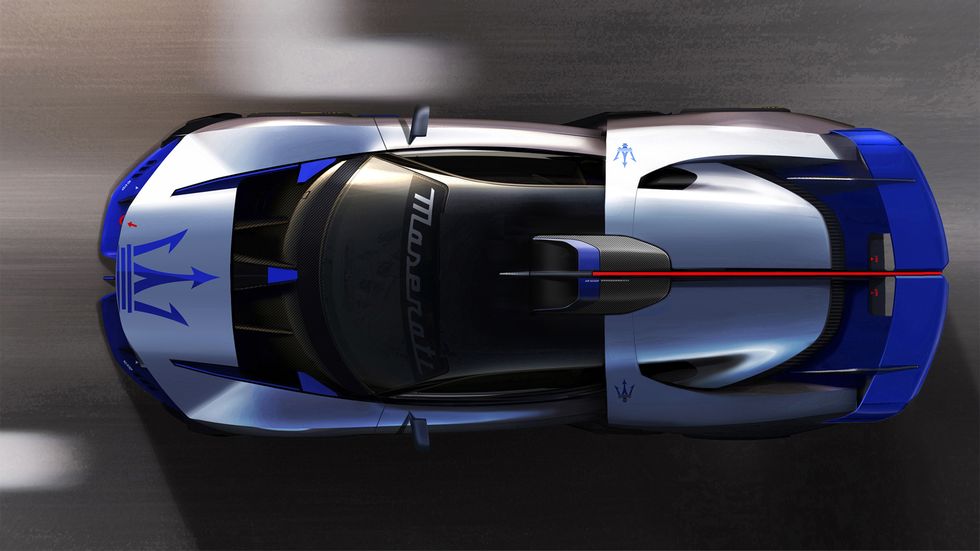- The Maserati Project24 is a track-only supercar based on the MC20, and just 62 examples will be built.
- The MC20’s Nettuno 3.0-liter V-6 engine has been tuned to make 740 horsepower, a 119-hp increase, thanks to a pair of new turbochargers.
- The Project24 makes its track focus clear with a carbon fiber body and monocoque, FIA-grade roll cage, ventilated Brembo brakes, and slick racing tires.
UPDATE 8/1/23: Maserati has announced that the Project24 is being renamed the MCXtrema, with a full reveal coming on August 18 at The Quail during Monterey Car Week. Maserati has also clarified that the MCXtrema will now be rated at 730 hp instead of the 740-hp figure that was previously quoted. Maserati also said all 62 examples have already been spoken for.
The 2022 Maserati MC20 heralds a rejuvenation for Maserati, bringing a svelte supercar design and a new twin-turbo 3.0-liter V-6 engine to a brand which has languished in recent years with a dated lineup and parts-bin sharing with lesser Stellantis marques. The MC20 also boasts impressive performance, with the Nettuno V-6 pumping out 621 horsepower and propelling the Italian beauty to 60 mph in a mere 3.2 seconds en route to a 202 mph top speed. But the MC20 is about to get even more extreme, with Maserati announcing the Project24, a track-exclusive supercar based on the MC20 and sporting a wild, sharp-edged design.
The Project24 is built around a carbon fiber monocoque, with the aggressive bodywork also fashioned from carbon fiber. So far Maserati has only shown three rendered images, which reveal the Project24’s towering rear wing, ankle-slicing front splitter, and thin LED headlights and taillights. There is also a boxy rear diffuser, center-mounted dual exhaust pipes, and plenty of scoops and vents carved into the slinky two-door body.
While the Project24 packs the same Nettuno 3.0-liter V-6 as the MC20, new turbochargers boost horsepower to a whopping 740 ponies, a 119-hp increase. The MC20’s eight-speed dual-clutch transmission is traded for a six-speed sequential racing gearbox operated via paddle shifters, and there is also a mechanical limited-slip differential in place of the MC20’s electronically controlled unit. Like the MC20, the Project24 will be rear-wheel drive, and Maserati is aiming to keep the dry weight below 2755 pounds, making it about 500 pounds lighter than the claimed dry weight for the MC20.
The Project24 will also be about two inches wider than its road-going counterpart, and will ride on 18-inch forged aluminum wheels wrapped in slick racing tires. Ventilated Brembo brakes should provide immense stopping power, while an unequal-length control arm suspension with adjustable dampers and front and rear anti-roll bars should make the Project24 nimble on track.
The Project24 is designed in accordance with FIA safety requirements, with a roll cage fitted inside the cabin. The interior will also include racing seats with six-point harnesses, an adjustable pedal box and steering column, and a carbon-fiber steering wheel with an integrated display. Owners will also have the option to add a rear-view camera, in-car camera, tire-pressure monitoring system, and telemetry recording. Surprisingly for a track car focused on minimizing weight, the Project24 will come with air conditioning. Maserati says it will build just 62 units of the Project24, with no timeline specified for its release. All we have right now are these renders, but real-world images and more details should be revealed in due course.
This story was originally published July 22, 2022.
This content is imported from poll. You may be able to find the same content in another format, or you may be able to find more information, at their web site.
Associate News Editor
Caleb Miller began blogging about cars at 13 years old, and he realized his dream of writing for a car magazine after graduating from Carnegie Mellon University and joining the Car and Driver team. He loves quirky and obscure autos, aiming to one day own something bizarre like a Nissan S-Cargo, and is an avid motorsports fan.
Read the full article here



